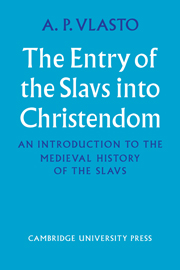Book contents
Summary
The Bulgars—whose name is interpreted as ‘mixed people—mixture’— part of a vast semi-nomadic horde speaking a Turkic language which ranged the steppes round the Sea of Azov in the fifth-seventh centuries, migrated under Khazar pressure from this ‘Great Bulgaria’ (as the Greeks called it) and reached the lower Danube about the year 660. The Byzantine government allowed, since it could not prevent, their leader Asparuch (Isperich) to bring them over the river and settle in the Dobrudja about the year 679. The next two centuries saw the gradual Slavisation of the Bulgars, the firm foundation of a state and its increasing penetration by the irresistably attractive culture of the Greeks.
Byzantine interest in this people and all its cousins on the steppes was of long standing: they were a possible menace to the security of the Empire, especially to its Crimean and Caucasian outposts. As early as 619, according to tradition, a Bulgar chieftain Kubrat (or Kovrat), who attempted to create a single Bulgar Empire of the steppes, was converted to Christianity as a friend and ally of the Emperor Heraklios. But this seems to have been a personal act without consequences for his subjects. Certainly none of his five sons, of whom Asparuch was one, was a Christian.
The conversion of Asparuch's successor Terbel (Tervel, 702–16?) is to be assumed. He was deeply involved in Byzantine politics in 704/5, helping the exiled Justinian II to regain his throne.
- Type
- Chapter
- Information
- The Entry of the Slavs into ChristendomAn Introduction to the Medieval History of the Slavs, pp. 155 - 235Publisher: Cambridge University PressPrint publication year: 1970



